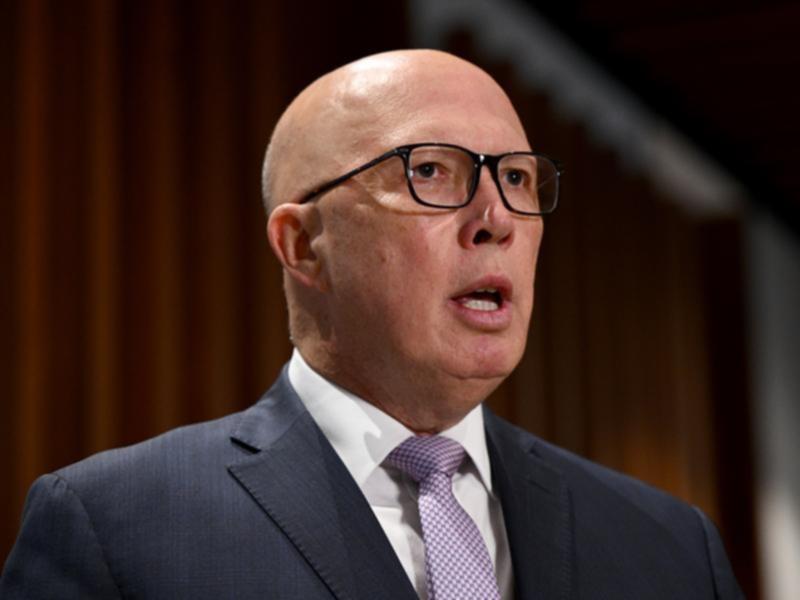MARK RILEY: Australian political party ideologies have been sent upside down in supermarket brawl
MARK RILEY: The supermarket brawl has Labor defending capitalist principles and the Coalition arguing for ‘Soviet-style’ intervention. It’s like a parallel universe.

The supermarket wars have projected Australian politics into something of a parallel universe.
On one side, the conservatives have become crusaders for sharp market intervention and punishing regulation.
On the other, Labor is morphing into the great protector of the basic principles of the free market, attacking threats to break up the supermarket giants as “Soviet-style” politics.
Sign up to The Nightly's newsletters.
Get the first look at the digital newspaper, curated daily stories and breaking headlines delivered to your inbox.
By continuing you agree to our Terms and Privacy Policy.Labor, the muscular guardians of the capitalist ethos?
Peter Dutton, an uncompromising Marxist-Leninist?
Has the Earth been knocked off its axis by a massive meteor strike we all somehow missed?
The common factor in all of this is that both claim to be on the shoppers’ side.
Each says their main objective is to get prices down.
But true to the tribal nature of our heavily contested political system, they can’t agree on the best way to achieve that.
“Can’t” — or “won’t” more likely.
The latest flashpoint has come from Craig Emerson’s draft review of the Food and Grocery Code of Conduct.
His central recommendation is that the voluntary code should become mandatory and carry the possibility of massive penalties.
Supermarkets found guilty of the most egregious, systemic breaches could face fines representing the greater of $10 million or 10 per cent of annual turnover.
For all the big four — Woolworths, Coles, Aldi and IGA — that effectively means 10 per cent of turnover.
Those amounts would be eye-wateringly huge.
Ten per cent of Woolworths’ current turnover would be $5.2 billion, Coles $3.3b, Aldi $1.3b and Metcash/IGA $880m.
The likelihood of a court imposing fines of that magnitude, though, is remote.
It is more likely that mandating the code would result in fines at the lower end of the scale — $188,000 for each breach — being handed out more regularly.
The supermarket giants have all now backed a mandatory code, but with qualifications.

Woolworths wants it to apply equally to other large companies that it sees as at least partial competitors in the grocery and household goods market — such as Costco, Amazon, Bunnings and Chemist Warehouse.
And what would the code actually do? And how would it affect the price for consumers?
As it stands, the code seeks to guard against add-on costs by prohibiting the big supermarkets from charging suppliers a premium for accepting their goods, promoting them in the stores or placing them more prominently on the shelves.
It also protects wholesalers against arbitrary changes to the supply chain imposed by the supermarkets and against any price changes during the life of a supply contract that isn’t agreed by both sides.
Dutton is attacking the draft for rejecting the real “big stick” — divestiture powers.
Those powers could force the supermarket giants to sell off parts of their businesses if they used their market dominance to force out competition.
They are the powers that Prime Minister Anthony Albanese has described as “Soviet-style.”

Dutton is also playing the man, describing the draft as: “A Mickey Mouse review conducted by a Labor mate”.
That is unfair to Emerson. He is indisputably a Labor mate. He was formerly a competition minister in the Rudd-Gillard-Rudd period.
But he is also an accomplished economist, who has corralled the support of the National Farmers Federation for his recommendations while maintaining the somewhat qualified backing of the supermarkets themselves.
If he achieves that with his final report in June, it will be an act more reminiscent of Mighty Mouse than Mickey.
And the Coalition isn’t perfectly united in its drive for divestiture powers, either.
Shadow finance minister Jane Hume said, “there is always a concern with divestiture powers, whether they will actually decrease prices”.
That was enough for Treasurer Jim Chalmers to claim that the Coalition was “all over the place on competition”.
The current Assistant Minister for Competition, Andrew Leigh, has also questioned Nationals leader David Littleproud’s spirited support now for a divestiture big stick his party didn’t introduce during nine years in government.
“The National Party are tigers in opposition but kittens in the cabinet,” Leigh said.
And, so, we have Labor defending big business against a big stick and the Coalition demanding more red lines and red tape.
The political world has gone topsy-turvy.
But shoppers won’t mind as long as this parallel universe stops their family budgets being smashed at the supermarket checkout.

